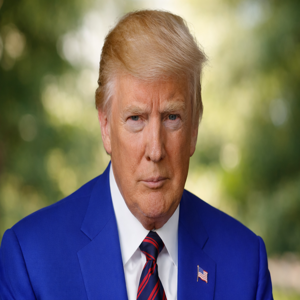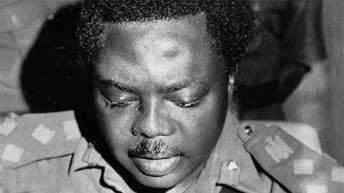By Jimmy Arch
The United States President, Donald Trump, has threatened to launch a military intervention in Nigeria for the government’s failure to prevent attacks on Christians.
Trump claimed in a post over the weekend (November 1-2, 2025) that “Radical Islamists are responsible for this mass slaughter” and warned that if the Nigerian government failed to stop the killings, Washington would “immediately stop all aid and assistance to Nigeria” and could go into that now disgraced country, gun-a-blazing.”
According to Trump, the US may use ground forces and airstrikes in Nigeria to halt the mass murder of Christians.
Trump’s comments followed weeks of lobbying by conservative Christian organizations and US politicians who wanted him to declare Nigeria a “country of particular concern” because of the alleged abuses of religious freedom, a move the US administration has already taken.
Nigeria is undoubtedly facing a complicated security dilemma, but some US Republicans are keen to portray the issue as solely religious. Citing an increase in attacks against Christians in the Middle Belt, US Senator Ted Cruz has said that the Nigerian government is complicit in a slaughter against Christians. Cruz said that since 2009, “Islamist” armed gangs have demolished 18,000 churches and 2,000 schools, killing 50,000 Christians.
A bill to punish Nigerian officials who Cruz claimed were “ignoring and even facilitating the mass murder of Christians” has also been introduced. Cruz announced the “Nigeria Religious Freedom Accountability Bill of 2025” in September 2025, claiming it will hold officials responsible for those who “facilitate Islamic Jihadist violence and the imposition of blasphemy laws.” Officials who “facilitate violence against Christians” and those who uphold blasphemy and Islamic laws are the targets of the measure. Additionally, it aims to label Boko Haram and its splinter group, the Islamic State of West Africa Province (ISWAP), as “entities of particular concern” and Nigeria as a “country of particular concern.”
How did Nigeria get here?
A large part of northern Nigeria has been plagued by insurgency and banditry for over a decade. An armed extremist Islamic militant group called Boko Haram has been attacking civilians and government institutions since July 2009. In Hausa, the term “Boko Haram” means “Western education is forbidden.”
Mass crimes against civilians have been committed in northeast Nigeria by Boko Haram and their offshoots, such as the Islamic State in West Africa Province (ISWAP). Beginning in the northeast in the early 2000s, Boko Haram aimed to topple Nigeria’s secular government and to create an Islamic state. Tens of thousands have been killed and nearly two million have been displaced as a result of Boko Haram’s attack, which has been continuing in 2025. They use suicide bombs, kidnappings, torture, rape, forced marriages, child soldier recruiting, and attacks on people, traditional and religious leaders, and government infrastructure.
Criminal groups locally known as bandits emerged in several states in northern Nigeria following the Boko Haram insurgency, intensifying the region’s cycle of bloodshed. In the states of Zamafara, Sokoto, Niger, Kebbi, Katsina, and Kaduna, they are quite active, attacking civilians and rustling animals. These armed bandits also carry out attacks in Benue, Taraba, Nasarawa, Plateau, and, recently, Kwara States.
They have been committing crimes like murder, rape, kidnapping, systematic cattle rustling, and looting since 2011. Preying on established farming communities serves as a major source of motivation for armed bandit groups, who are primarily driven by criminal objectives. Large tracts of farmland are also being overrun by them, which has caused many farmers to flee their property for fear of being attacked. For the gangs, kidnapping for ransom is a significant source of revenue, and the crime continues to pose a danger to Nigeria’s security environment. In 2022, the Buhari administration designated bandits as terrorists in line with a Federal High Court ruling. Recently, Boko Haram has bolstered its influence by joining forces with the bandits.
America’s claim: What is genocide in international law?
The first issue to address is what genocide is in international law. Genocide involves the intentional and organized annihilation, in whole or in part, of an ethnic, racial, religious, or national group. The term “genocide” was invented by Raphael Lemkin from the Greek word genos, which means race, nation, or tribe, and the Latin word cide, meaning killing. The word attained prominence following the atrocities and mass killings of the Second World War. Article 2 of the Convention on the Prevention and Punishment of the Crime of Genocide, 1948, defines genocide as follows:
…any of the following acts committed with the intent to destroy, in whole or in part, a national, ethnical, racial, or religious group, as such:
(a) Killing members of the group;
(b) Causing serious bodily or mental harm to members of the group;
(c) Deliberately inflicting on the group conditions of life calculated to bring about its physical destruction in whole or in part;
(d) Imposing measures intended to prevent births within the group;
(e) Forcibly transferring children of the group to another group.
Thus, genocide is the deliberate and systematic killing or persecution of a group of people because of their ethnicity, nationality, religion, or race.
Reactions to Trump’s remarks
Trump’s remarks have generated reactions within and outside Nigeria. The American threat has been a major talking point among concerned Nigerians, including politicians, clergymen, lawyers, civil servants, students, journalists, businessmen, and public commentators. In fact, every Nigerian is concerned and worried.
Nigeria has said that while it welcomes help in tackling Islamist insurgents, the US must respect its sovereignty. Nigeria has denied claims of religious persecution and defends the country’s efforts to protect religious freedom. “The characterization of Nigeria as religiously intolerant does not reflect our national reality, nor does it take into consideration the consistent and sincere efforts of the government to safeguard freedom of religion and beliefs for all Nigerians,” President Tinubu said in a statement.
The Nigerian government, while admitting a security problem, has strongly denounced the claims of genocide. The Minister of Information and National Orientation described the claims as false, misleading, and not reflective of the reality on the ground. The Nigerian Senate has vehemently rejected the claim of genocide against Christians.
Abdullahi Sule, the governor of Nasarawa State, responded by calling allegations of a religious genocide in Nigeria untrue and harmful, arguing that religion has no bearing on the nation’s internal security issues. Osun State Governor Ademola Adeleke has called for a resumption of diplomatic relations.
In response to Cruz’s allegations, the Christian Association of Nigeria (CAN) stated that foreign organizations were attempting to take advantage of domestic difficulties and that Christians were not the only targets of the country’s killings.
On a global scale, the Chinese government has condemned the American threat and promised to assist Nigeria, calling the issue a Nigerian internal concern. Following President Trump’s threat of military action over claimed religious persecution, the European Union has spoken up for Nigeria.
Action by the Tinubu administration to end violence and insecurity
The primary responsibility of the government is the security and welfare of its citizens. The Nigerian government has been battling Boko Haram since 2009 and banditry since 2011. In 2011, the government enacted the Terrorism (Prevention) Act and the Terrorism (Prevention (Amendment) Act 2013 for combating terrorism and its financing in Nigeria. The armed groups defied all military actions by the Jonathan and Buhari administrations to exterminate them.
President Bola Tinubu inherited the challenges posed by non-state armed groups in 2023, and his administration has been battling them through various measures. Taking the battle to the extremists is the present administration’s plan to eradicate insecurity.
In order to curb the actions of armed bandits, the government has stepped up military operations and launched counterterrorism operations in affected areas since it assumed power in 2023. President Tinubu reaffirmed his commitment to ending insecurity by adding additional combat helicopters to the Nigerian Air Force arsenal. The Nigerian Air Force’s Order of Battle (ORBAT) now includes a King Air 360ER Beechcraft and two brand-new T-129 ATAK helicopters.
Additionally, the administration has increased livelihood aid for Nigerians through socioeconomic policies. The administration’s Presidential Conditional Grant Scheme has helped 600,000 small enterprises, and the government has disbursed almost N570 billion to the 36 states. The Federal Ministry of Livestock Development was established by the federal government in July 2024 to provide food security and resolve the persistent disputes between herders and sedentary farmers.
The federal government has also touched millions of vulnerable households through cash transfer payments. By giving beneficiary households timely and convenient cash transfers, this program seeks to advance development priorities and objectives by focusing on the poorest households in the country. It is evident that cash transfer programs have a big impact on poverty and vulnerability.
Roads, bridges, trains, electricity, and oil and gas developments—most notably the Lagos-Calabar Coastal Highway and Sokoto Badagry Highway projects—are among the major infrastructure projects that are still underway. In addition to infrastructural development, the federal government has established development commissions in each of the six geographical zones of the nation.
As part of additional strategies, President Tinubu on Friday, October 24, 2025 announced sweeping changes in the military hierarchy “in furtherance of the efforts of the Federal Government of Nigeria to strengthen the national security architecture,” The President Appointed General Olufemi Oluyede as the new Chief of Defence Staff, Major-General W. Shaibu, Chief of Army Staff, Air Vice Marshal S.K. Aneke, Chief of Air Staff, and Rear Admiral I. Abbas, Chief of Naval Staff. Major-General E.A.P. Undiendeye retains his position as Chief of Defence Intelligence.
Should Trump’s threat be taken seriously?
While his remarks are of grave concern, some people believe that he is just bluffing. However, others think Trump is serious and unpredictable.
Since he took office as president, Trump has adopted a more belligerent approach in international relations than diplomacy. In September 2025, he rebranded the Department of Defense as the Department of War, saying defense is too defensive as the US wants “to be offensive too.”
Trump has launched missile attacks on armed groups in Yemen, killing several people. Trump is at war with drug smugglers involved in illicit narcotics in the Pacific. Boat operators have lost about 68 people to American attacks in the Pacific. Fishermen are afraid to enter the high seas for fear of being mistaken for drug smugglers. The US attacked Iran on 22 June 2025 to destroy its nuclear programme.
In a new White House video on Wednesday (6 November 2025), Trump repeated his threat of military action in Nigeria. He has already designated Nigeria a “country of particular concern” (CPC). This means Nigeria is officially identified as committing or tolerating “systematic, ongoing, and egregious violations of religious freedom.” Being labeled a CPC can affect foreign aid, military cooperation, and diplomatic relations.
Nigerian officials should engage their US counterparts diplomatically to avert any American invasion. America is the only superpower in the world after the demise of the Soviet Union in 1991, and no nation on the globe can challenge it.
The situation in Nigeria should not be politicized; it calls for unity and support for the government to overcome the security challenges plaguing the country. The newly appointed Service Chiefs should be empowered to deliver on their mandates. The US can help Nigeria with technical and intelligence support to defeat terrorists.





Add comment